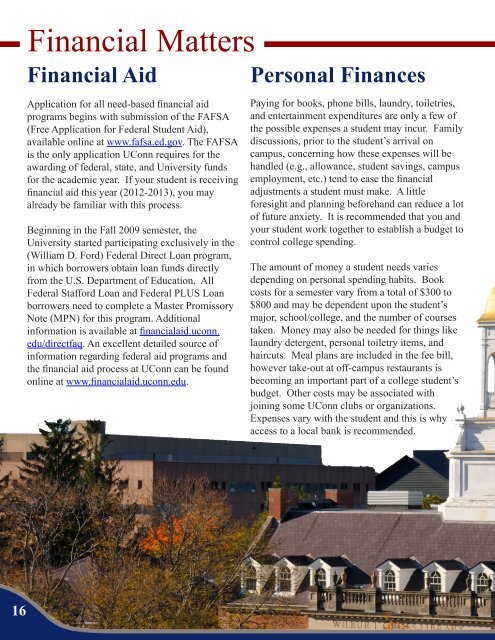Parent Handbook - Parents Association - University of Connecticut
Parent Handbook - Parents Association - University of Connecticut
Parent Handbook - Parents Association - University of Connecticut
Create successful ePaper yourself
Turn your PDF publications into a flip-book with our unique Google optimized e-Paper software.
16<br />
Financial Matters<br />
Financial Aid<br />
Application for all need-based financial aid<br />
programs begins with submission <strong>of</strong> the FAFSA<br />
(Free Application for Federal Student Aid),<br />
available online at www.fafsa.ed.gov. The FAFSA<br />
is the only application UConn requires for the<br />
awarding <strong>of</strong> federal, state, and <strong>University</strong> funds<br />
for the academic year. If your student is receiving<br />
financial aid this year (2012-2013), you may<br />
already be familiar with this process.<br />
Beginning in the Fall 2009 semester, the<br />
<strong>University</strong> started participating exclusively in the<br />
(William D. Ford) Federal Direct Loan program,<br />
in which borrowers obtain loan funds directly<br />
from the U.S. Department <strong>of</strong> Education. All<br />
Federal Stafford Loan and Federal PLUS Loan<br />
borrowers need to complete a Master Promissory<br />
Note (MPN) for this program. Additional<br />
information is available at financialaid.uconn.<br />
edu/directfaq. An excellent detailed source <strong>of</strong><br />
information regarding federal aid programs and<br />
the financial aid process at UConn can be found<br />
online at www.financialaid.uconn.edu.<br />
Personal Finances<br />
Paying for books, phone bills, laundry, toiletries,<br />
and entertainment expenditures are only a few <strong>of</strong><br />
the possible expenses a student may incur. Family<br />
discussions, prior to the student’s arrival on<br />
campus, concerning how these expenses will be<br />
handled (e.g., allowance, student savings, campus<br />
employment, etc.) tend to ease the financial<br />
adjustments a student must make. A little<br />
foresight and planning beforehand can reduce a lot<br />
<strong>of</strong> future anxiety. It is recommended that you and<br />
your student work together to establish a budget to<br />
control college spending.<br />
The amount <strong>of</strong> money a student needs varies<br />
depending on personal spending habits. Book<br />
costs for a semester vary from a total <strong>of</strong> $300 to<br />
$800 and may be dependent upon the student’s<br />
major, school/college, and the number <strong>of</strong> courses<br />
taken. Money may also be needed for things like<br />
laundry detergent, personal toiletry items, and<br />
haircuts. Meal plans are included in the fee bill,<br />
however take-out at <strong>of</strong>f-campus restaurants is<br />
becoming an important part <strong>of</strong> a college student’s<br />
budget. Other costs may be associated with<br />
joining some UConn clubs or organizations.<br />
Expenses vary with the student and this is why<br />
access to a local bank is recommended.


